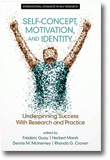
Self-Concept, Motivation and Identity
Underpinning Success with Research and Practice
Edited by:
Frédéric Guay, Université Laval Québec
Herbert Marsh, Australian Catholic University
Dennis M. McInerney, The Education University of Hong Kong
Rhonda G. Craven, Australian Catholic University
A volume in the series: International Advances in Self Research. Editor(s): Herbert Marsh, Australian Catholic University. Rhonda G. Craven, Australian Catholic University. Dennis M. McInerney, The Education University of Hong Kong. Frédéric Guay, Université Laval Québec. Theresa Dicke, Australian Catholic University.
Published 2015
The concept of the Self has a long history that dates back from the ancient Greeks such as Aristotle to more contemporary thinkers such as Wundt, James, Mead, Cooley, Freud, Rogers, and Erikson (Tesser & Felson, 2000). Research on the Self relates to a range of phenomena including self-esteem, self-concept, self-protection, self-verification, self-awareness, identity, self-efficacy, self-determination etc. that could be sharply different or very similar. Despite this long tradition of thinkers and the numerous studies conducted on the Self, this concept is still not very well defined. More precisely, it is not a precise object of study, but rather a collection of loosely related subtopics (Baumesiter, 1998). Also, in the philosophical literature, the legitimacy of the concept of “self” has been brought into question. Some authors have argued that the self is not a psychological entity per se, but rather an illusion created by the complex interplay between cognitive and neurological subsystems (Zahavi, 2005). Although no definitive consensus has been reached regarding the Self, we emphasis in this volume that the Self and its related phenomena including self-concept, motivation, and identity are crucial for understanding consciousness and therefore important to understand human behavior.
Self-concept, motivation and identity: Underpinning success with research and practice provides thus a unique insight into self-concept and its relationship to motivation and identity from varied theoretical and empirical perspectives. This volume is intended to develop both theoretical and methodological ideas and to present empirical evidence demonstrating the importance of theory and research to effective practice.
CONTENTS
Preface. Intentional-Self Regulation and Identity Processes in Adolescence: Perspectives on Research and Application, Sara K. Johnson and Richard M. Lerner. Self-Enhancing Self-Presentation: Interpersonal, Relational, and Organizational Implications, Constantine Sedikides, Vera Hoorens, and Michael Dufner. The Political Self, Sean T. Stevens, Stephanie M. Anglin, and Lee Jussim. A Personal Agency View of Self-Regulated Learning: The Role of Goal Setting, Barry J. Zimmerman, Dale H. Schunk, and Maria K. DiBenedetto. Dimensional Comparison Theory: An Extension of the Internal/External Frame of Reference Model, Herbert W. Marsh, Philip D. Parker, and Rhonda G. Craven. Too Much Time Has Been Spent on the Time Devoted to Homework: Motivation Is the Key Constant in Homework Research, Ulrich Trautwein, Oliver Lüdtke, Benjamin Nagengast, and Barbara Flunger. Social Cognitive Career Theory: A Theory of Self (Efficacy) in Context, Steven D. Brown and Robert W. Lent. Self-Beliefs and Self-Regulation in Health Behavior Change, Ralf Schwarzer and Aleksandra Luszczynska. Confidence: Is It Different From Self-Efficacy and Is It Important?, Lazar Stankov and Jihyun Lee. Achievement and the Self: Approach and Avoidance as Self-Growth and Self-Protection, Emily J. Greenwood, Rachel M. Korn, and Andrew J. Elliot. Motivation: A Philosophical and Psychological Synthesis, Laurance J. Splitter and Dennis M. McInerney. Competence Within Context: Implications for the Development of Positive Student Identities and Motivation at School, Kathryn R. Wentzel. About the Contributors.
-
Paperback978-1-68123-167-9
Web price: $45.04 (Reg. 52.99)
-
Hardcover978-1-68123-168-6
Web price: $80.74 (Reg. 94.99)
- eBook978-1-68123-169-3

-
 International Advances in Self Research - volume 1
International Advances in Self Research - volume 1
-
 New Frontiers for Self Research
New Frontiers for Self Research
-
 SELF - A Multidisciplinary Concept
SELF - A Multidisciplinary Concept
-
 SELF - Driving Positive Psychology and Wellbeing
SELF - Driving Positive Psychology and Wellbeing
-
 Self-Processes, Learning and Enabling Human Potential
Dynamic New Approaches
Self-Processes, Learning and Enabling Human Potential
Dynamic New Approaches
-
 Theory Driving Research:
New Wave Perspectives On Self-Processes And Human Development
Theory Driving Research:
New Wave Perspectives On Self-Processes And Human Development

